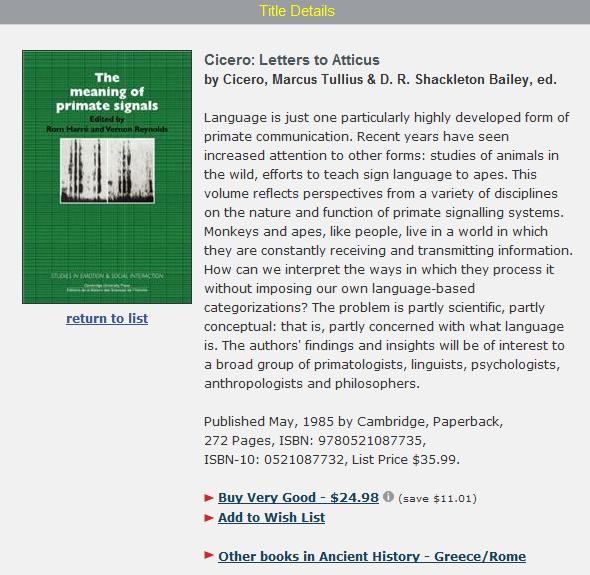|
Powered by WordPress
|
Thursday: December 30, 2010
From the site of a bookseller whose name (and URL) I will kindly omit:

Cicero was a primate, and letters are no doubt symbols as well as collections of symbols, and Cicero’s letters are a “particularly highly-developed form of primate communication”, but I think the blurb is meant for the book pictured, not the bold-faced title.
I wonder which book you get if you click on the ‘buy’ link.
Wednesday: December 29, 2010
The Rat is disappointed by a recent science article about drugs and alcohol in the (wild) animal kingdom: “How can you write about porcupines ingesting a hallucinogenic substance and not include a photo of same?!” Surely a YouTube video of a hopped-up porcupine would be infinitely better? The ubiquity of Flip cameras and such makes that a very reasonable request: this isn’t the ’50s.
In her 2010 Christmas song post on “O Holy Night”, Ann Althouse links back to her 2004 Christmas song post, in which she compared 18 versions of “Blue Christmas”, beginning with Elvis’s, “the best” and imitated by seveal of the others. Although she included a couple of country singers, she somehow missed Ernest Tubb, who first made the song popular in 1949. Apparently, for Althouse, music starts with Elvis. I haven’t heard any of the other 17 versions she lists, much less the 65+ other versions Wikipedia estimates to have been made, but Tubb’s version seems much better than Elvis’s. Perhaps I should say “versions”, since he recorded it at least twice. The later one is much better in that it omits the backup singers.
Fans of bluegrass and other traditional American music all know “The Wreck of the Old 97”. Without even trying, I have acquired five versions by four different artists for my iPod: Ernest Stoneman & Kayle Brewer, Hank Thompson, Johnny Cash (live, at San Quentin), and two by Mac Wiseman. For those who do not know the song, it usually begins something like this:
Well they gave him his orders at Monroe, Virginia,
Saying “Steve, you’re way behind time.
This is not 38, it’s old 97.
You must put her into Spencer on time.”
A complete set of lyrics – more complete than in any version I have heard sung – will be found at the Blue Ridge Institute & Museum website. Most singers start with the third verse, quoted above.
Wikipedia’s article on the wreck and the song includes a detail I had not known:
During the late 1940s, a parody of the ballad was sung that mocked the ties that the folk singer Pete Seeger had to the Communist Party.
They give the first four lines, which is enough for Google to find the rest at the Socialist Songbook website:
THE BALLAD OF PETE SEEGER
(Tune: Wreck of the Old ’97)
Well, they gave him his orders
Up at party headquarters,
Saying, “Pete, you’re way behind the times,
This is not ’38; this is 1947,
And there’s been a change in that old party line.”
Well, it’s a long, long haul
From “Greensleeves” to “Freiheit”,
And the distance is more than long,
But that great outfit they call the People’s Artists
Is on hand with those good old People’s songs.
Their motives are pure, their material is corny,
But their spirit will never be broke.
And they go right on in their great noble crusade –
Of teaching folk songs to the folk.
Wikipedia’s Pete Seeger article doesn’t mention the parody.
Monday: December 20, 2010
“The period of the winter solstice had been always a great festival with the northern nations, the commencement of the lengthening of the days being, indeed, of all points in the circle of the year, that in which the inhabitants of cold countries have most cause to rejoice. This great festival was anciently called Yule; whether derived from the Gothic Iola, to make merry; or from the Celtic Hiaul, the sun; or from the Danish and Swedish Hiul, signifying wheel or revolution, December being Hiul-month, or the month of return; or from the Cimbric word Ol, which has the important signification of ALE, is too knotty a controversy to be settled here: but Yule had been long a great festival, with both Celts and Saxons; and, with the change of religion, became the great festival of Christmas, retaining most of its ancient characteristics while England was Merry England; a phrase which must be a mirifical puzzle to any one who looks for the first time on its present most lugubrious inhabitants.
“The mistletoe of the oak was gathered by the Druids with great ceremonies, as a symbol of the season. The mistletoe continued to be so gathered, and to be suspended in halls and kitchens, if not in temples, implying an unlimited privilege of kissing; which circumstance, probably, led a learned antiquary to opine that it was the forbidden fruit.
“The Druids, at this festival, made, in a capacious cauldron, a mystical brewage of carefully-selected ingredients, full of occult virtues, which they kept from the profane, and which was typical of the new year and of the transmigration of the soul. The profane, in humble imitation, brewed a bowl of spiced ale, or wine, throwing therein roasted crabs; the hissing of which, as they plunged, piping hot, into the liquor, was heard with much unction at midwinter, as typical of the conjunct benignant influences of fire and strong drink. The Saxons called this the Wassail-bowl, and the brewage of it is reported to have been one of the charms with which Rowena fascinated Vortigern.”
(Thomas Love Peacock, The Misfortunes of Elphin, Chapter XII)
The “roasted crabs” of the third paragraph are surely crab-apples rather than crustaceans.
|
|


